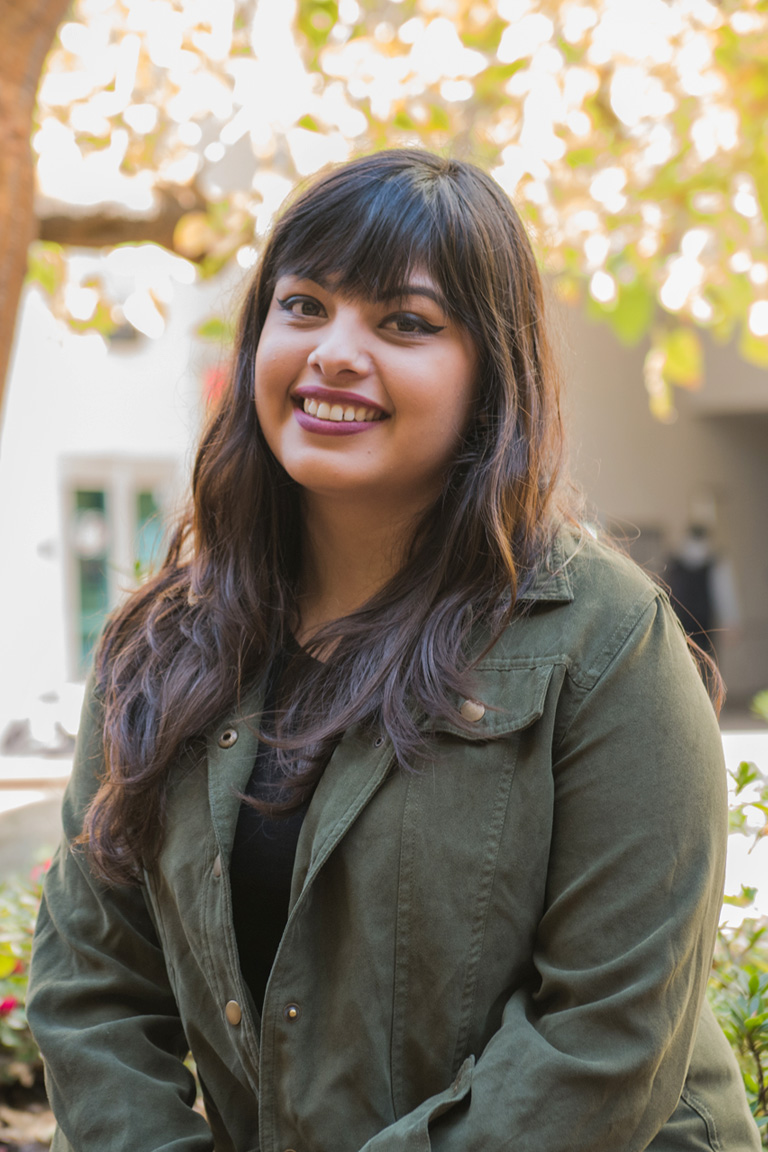 When Adriana (Aimee) Vaquera asked her parents to go on a senior trip to Europe while in high school, they said no, “You won’t be able to come back.”
When Adriana (Aimee) Vaquera asked her parents to go on a senior trip to Europe while in high school, they said no, “You won’t be able to come back.”
“That’s when they told me I was not a U.S. citizen. I was a little bit shocked, but not that surprised because in middle school there was a school trip across the state, and my parents wouldn’t let me go on that trip either, telling me that they were just worried that something might happen to me,” said Vaquera, a California State University, Dominguez Hills (CSUDH) criminal justice major. “Even in high school I didn’t fully understand because you grow up feeling that you’re just like everybody else. But when I wanted to work and go to college and realized I didn’t have a Social Security number, then reality sunk in.”
After her parents broke the news that she was an undocumented student, they began sharing the back story of their immigration to the U.S. with her. Born in Durango, Mexico, in 1993, Vaquera was two-and-a-half years old when she and her mother illegally immigrated to the U.S. However, her mother was unable to cross the border with her, so she reluctantly put her in the care of a couple she didn’t know very well.
“I was posing as their child; the problem was I kept crying for my mother,” said Vaquera, who was reunited later that day and eventually made their way to their destination and Vaquera’s father, who had traveled to the U.S. earlier to establish a home for them and find work. “Sometimes you don’t have a choice but to take extreme measures and put your faith in people you don’t really know too well, which can happen throughout the life of undocumented people in the U.S.”
Embracing a certain amount of blind trust is just one of the challenges a family faces when immigrating to the U.S.–second only to finding a home and employment. Her parents migrated to the U.S. due to the lack of work and career opportunities in Mexico. Even with both of them working they could not foresee a sustainable future for their young family.
Her father eventually started his own business, which is a common and often a safer way to generate income for undocumented immigrants raising a family. While he pays taxes as a business owner, he is unable to benefit from the tax write-offs and refunds others do.
Her Right to Excel
Unlike her father, Vaquera, was given the right to work in the U.S. and not fear deportation after she applied for and received Deferred Action for Childhood Arrivals (DACA) status. Along with her studies, she works part-time for the County of Los Angeles Library system, and is lead transfer peer coach in CSUDH’s University Advisement Center (UAC), where she helped create and launch the UAC’s Transfer Learning Community program, better known as DHTLC.
“I was recruited, in a way, to launch the program because I was a transfer student, too. I helped open a portal to bring transfer students in and ensure there was and continues to be something in place for them,” said Vaquera, who transferred to CSUDH in fall 2015. “We [two additional peer coaches] provide them the support and feedback they may not be able to obtain from faculty and staff–only from those who know what they are directly going through. It’s all about closing those gaps that transfer students tend to overlook.”
Being both a transfer student and a peer coach with DACA status enables Vaquera to offer unique experience-driven guidance to her cohort of transfer students, particularly other DACA students.
“I’m in a unique situation. When I come across Dreamers or DACA students, or those who cannot benefit from DACA or the DREAM Act, I use my similar experiences to help them acclimate to their new environment. It’s good for them to form such a positive relationship when they arrive on campus,” Vaquera said. “I tell them, ‘You did it. You finished community college, and now you’re here.’ Undocumented students, whether under DACA or not do require extra documentation and academic guidance before transferring, so providing extra attention is really big for them.”
Working at CSUDH has provided Vaquera a “well-rounded working environment.”
“At the top, there’s tons of meetings going on to ensure the university flows properly, and down here there are confused students walking around trying to figure out life. And I love that,” said Vaquera. “You really need to experience every aspect of the system to understand where people are coming from. You can’t just jump into the highest position and miss all the important learning opportunities in the middle.”
Vaquera’s work at CSUDH has also encouraged her to keep her professional options open.
“People tell you to set goals and shoot for them, but then you end up in the weirdest places. We’ll see what happens. I just applied for my master’s in higher education. The master’s degree will be in counseling, but ultimately I want to work in student affairs,” said Vaquera, who was conferred an associate’s degree in administrative justice before transferring to CSUDH. “However, I also love law, and I am very passionate about studying and trying to understand it. I do see myself attending law school in the future. My passion is immigration law, which is one of the most complex laws because we have an interesting immigration system, to say the least.”